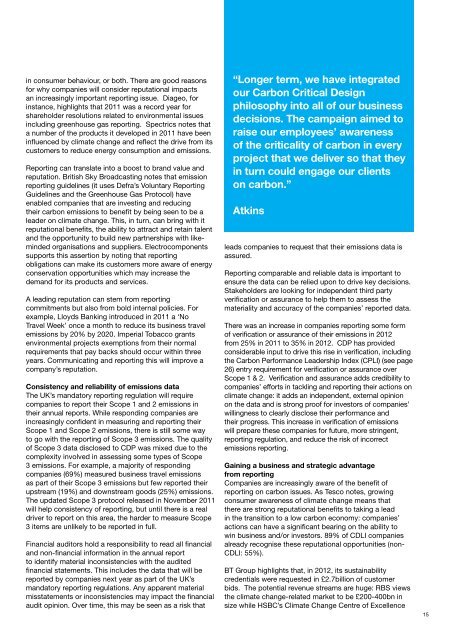CDP-FTSE-350-Climate-Change-Report-2012
CDP-FTSE-350-Climate-Change-Report-2012
CDP-FTSE-350-Climate-Change-Report-2012
You also want an ePaper? Increase the reach of your titles
YUMPU automatically turns print PDFs into web optimized ePapers that Google loves.
in consumer behaviour, or both. There are good reasons<br />
for why companies will consider reputational impacts<br />
an increasingly important reporting issue. Diageo, for<br />
instance, highlights that 2011 was a record year for<br />
shareholder resolutions related to environmental issues<br />
including greenhouse gas reporting. Spectrics notes that<br />
a number of the products it developed in 2011 have been<br />
influenced by climate change and reflect the drive from its<br />
customers to reduce energy consumption and emissions.<br />
<strong>Report</strong>ing can translate into a boost to brand value and<br />
reputation. British Sky Broadcasting notes that emission<br />
reporting guidelines (it uses Defra’s Voluntary <strong>Report</strong>ing<br />
Guidelines and the Greenhouse Gas Protocol) have<br />
enabled companies that are investing and reducing<br />
their carbon emissions to benefit by being seen to be a<br />
leader on climate change. This, in turn, can bring with it<br />
reputational benefits, the ability to attract and retain talent<br />
and the opportunity to build new partnerships with likeminded<br />
organisations and suppliers. Electrocomponents<br />
supports this assertion by noting that reporting<br />
obligations can make its customers more aware of energy<br />
conservation opportunities which may increase the<br />
demand for its products and services.<br />
A leading reputation can stem from reporting<br />
commitments but also from bold internal policies. For<br />
example, Lloyds Banking introduced in 2011 a ‘No<br />
Travel Week’ once a month to reduce its business travel<br />
emissions by 20% by 2020. Imperial Tobacco grants<br />
environmental projects exemptions from their normal<br />
requirements that pay backs should occur within three<br />
years. Communicating and reporting this will improve a<br />
company’s reputation.<br />
Consistency and reliability of emissions data<br />
The UK’s mandatory reporting regulation will require<br />
companies to report their Scope 1 and 2 emissions in<br />
their annual reports. While responding companies are<br />
increasingly confident in measuring and reporting their<br />
Scope 1 and Scope 2 emissions, there is still some way<br />
to go with the reporting of Scope 3 emissions. The quality<br />
of Scope 3 data disclosed to <strong>CDP</strong> was mixed due to the<br />
complexity involved in assessing some types of Scope<br />
3 emissions. For example, a majority of responding<br />
companies (69%) measured business travel emissions<br />
as part of their Scope 3 emissions but few reported their<br />
upstream (19%) and downstream goods (25%) emissions.<br />
The updated Scope 3 protocol released in November 2011<br />
will help consistency of reporting, but until there is a real<br />
driver to report on this area, the harder to measure Scope<br />
3 items are unlikely to be reported in full.<br />
Financial auditors hold a responsibility to read all financial<br />
and non-financial information in the annual report<br />
to identify material inconsistencies with the audited<br />
financial statements. This includes the data that will be<br />
reported by companies next year as part of the UK’s<br />
mandatory reporting regulations. Any apparent material<br />
misstatements or inconsistencies may impact the financial<br />
audit opinion. Over time, this may be seen as a risk that<br />
“Longer term, we have integrated<br />
our Carbon Critical Design<br />
philosophy into all of our business<br />
decisions. The campaign aimed to<br />
raise our employees’ awareness<br />
of the criticality of carbon in every<br />
project that we deliver so that they<br />
in turn could engage our clients<br />
on carbon.”<br />
Atkins<br />
leads companies to request that their emissions data is<br />
assured.<br />
<strong>Report</strong>ing comparable and reliable data is important to<br />
ensure the data can be relied upon to drive key decisions.<br />
Stakeholders are looking for independent third party<br />
verification or assurance to help them to assess the<br />
materiality and accuracy of the companies’ reported data.<br />
There was an increase in companies reporting some form<br />
of verification or assurance of their emissions in <strong>2012</strong><br />
from 25% in 2011 to 35% in <strong>2012</strong>. <strong>CDP</strong> has provided<br />
considerable input to drive this rise in verification, including<br />
the Carbon Performance Leadership Index (CPLI) (see page<br />
26) entry requirement for verification or assurance over<br />
Scope 1 & 2. Verification and assurance adds credibility to<br />
companies’ efforts in tackling and reporting their actions on<br />
climate change: it adds an independent, external opinion<br />
on the data and is strong proof for investors of companies’<br />
willingness to clearly disclose their performance and<br />
their progress. This increase in verification of emissions<br />
will prepare these companies for future, more stringent,<br />
reporting regulation, and reduce the risk of incorrect<br />
emissions reporting.<br />
Gaining a business and strategic advantage<br />
from reporting<br />
Companies are increasingly aware of the benefit of<br />
reporting on carbon issues. As Tesco notes, growing<br />
consumer awareness of climate change means that<br />
there are strong reputational benefits to taking a lead<br />
in the transition to a low carbon economy: companies’<br />
actions can have a significant bearing on the ability to<br />
win business and/or investors. 89% of CDLI companies<br />
already recognise these reputational opportunities (non-<br />
CDLI: 55%).<br />
BT Group highlights that, in <strong>2012</strong>, its sustainability<br />
credentials were requested in £2.7billion of customer<br />
bids. The potential revenue streams are huge: RBS views<br />
the climate change-related market to be £200-400bn in<br />
size while HSBC’s <strong>Climate</strong> <strong>Change</strong> Centre of Excellence<br />
15


